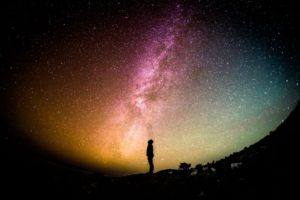
In order to answer the question ‘what is cosmic consciousness?’ we must start from a philosophical distinction: philosophy distinguishes between the continuous character of perception and intuitions, on the one hand, and the discontinuous one of concepts, on the other hand. By proceeding thus, philosophy acknowledges that our concepts cut out contents from that continuum of perception, creating seemingly enduring or fixed entities.
For example, when we see a tree in a garden, we identify it as a tree belonging to a certain species. We isolate it from the background of the rest of the garden and consider it a bearer of a form that we can meet in the case of similar different trees belonging to the same biological species. The philosophical tradition bestowed a lot of importance on this form or shape that separated things at the expense of the continuity of perception, a continuity which was vastly ignored.
The reason why this happened might be found in the argument of Aristotle that knowledge exists only with respect to universal traits, that knowledge means identifying those universal traits present within individual things. If one wanted to remain at the level of the pure individual, then one would renounce knowledge, because one cannot associate that individual with any other reality to which it is similar. Thus, philosophers considered that individuum est ineffabile, that individual existence is ineffable. Remarkably, this attitude drove off the attention from the question of the continuity of perception.
Certainly, immersion in this continuity cannot be maintained for very long (and for many of us it cannot even be reached at all), because one of the reasons why we need concepts is grounded in our practical needs: we cannot satisfy them without being aware of the differences between things, and focusing on these differences so that we can accomplish our deeds in the best way. To survive, we need to divide reality, to pull into the foreground things, traits or actions and to ignore other aspects entirely. Living means selecting.
However, there are situations when this structure of consciousness is removed, when people feel themselves at one with reality, when they feel as if the usual separation of mind and reality has disappeared. In these states, personal identity seems to dissolve into something much larger called ‘cosmic consciousness,’ leaving behind a feeling of a (loving) grasp of the whole world.
Often, people experience the presence of a benevolent entity that accompanies them during this unusual happening. Those who have not experienced such states cannot make pronouncements concerning their nature. They cannot say if they are just hallucination or involve objective factors. Many of those who reach the level of the cosmic consciousness come out of it inwardly transformed and religiously invigorated, claiming that the presence they had felt was truly God.
The structure of consciousness is one of the most mysterious things. Many of today’s scientists believe that by showing the correspondence between brain processes and mental contents this age-old issue can be settled. They think that they can discover how the brain generates consciousness
However, consciousness is not like a material thing that has definite shape and consistency. It is a very dynamic being: it depends on history, language, and culture in general.

The primitive mentality is known to be different from the mindset of people belonging to a more advanced civilization and culture. Man always lives within a network of meanings and ideas that structure his relation to the world. And this network seems to him the most natural and evident thing in the world.
It has been said that some primitive tribes identified themselves with a certain species of birds or with other animals. Certainly, from our present point of view, such a belief is childish and denotes an inferior intellectual development. But certainly our present convictions – scientific, moral, ontological, etc. – will seem just as childish to the people living in a far remote future as the primitive beliefs look to us. That means that our explanations are not true descriptions of ‘facts,’ but only historically determined interpretations.
From this perspective, an attempt to reduce the contents of consciousness to brain activity errs as naive realism. In comparison to us, primitives have a much less developed individuality, a less defined subject-object opposition, and thus a far less elaborated categorical structure. Thus, their brain activity will never produce the same mental contents that are characteristic of us.
What is more relevant for the present context is that this less-developed structure of self-consciousness is accompanied by a deeper communion with nature: because primitives lack the strong sense of individual self that defines us they seem to identify themselves more with outer nature. That strong individual self is precisely the result of the long historical and cultural development of humankind.
During this process, human beings learned to control themselves, to alienate themselves increasingly from nature, to set ever more abstract goals, to wrap themselves up more and more in a vast network of concepts and ideas, ultimately to replace immediate life with representation, with culture. We have learned to live more in a world of thoughts than in the immediate world of senses and perceptions.
We may infer thus that ‘cosmic consciousness’ is a relapse into an archaic level of consciousness: people who experience such states tend to perceive external and internal realities according to the mindset of primitives, or, who knows, maybe to an even less developed way of perception.
And because the content of the present consciousness cannot completely vanish – which is due, perhaps, to biological determination, because the current cultural set of structures might have been ingrained into the brain – the state of the ‘cosmic consciousness’ comprises not only elements of outer nature but also historical and cultural data. That is why reports of such experiences can describe visions of events belonging to civilizational human history.
As with every replacement of ordinary self-consciousness, this relapse into an archaic level of consciousness can release very intense emotions.

What is important for the present discussion is that an existing structure of self-consciousness is not something immutable and unshakable: the individual can, so to speak, always take off and put on this structure: a dreamless sleep cancels self-consciousness entirely for a while. And to be sure, dream is a relapse either into an archaic level (the collective unconsciousness) or just a past individual level of consciousness. Also, both on the individual level and on that of humankind, self-consciousness evolves. This flexible condition of the self-consciousness makes possible such phenomena as ‘cosmic consciousness’ or mystical psychological states, allowing also their integration into the future structure of consciousness.
Due to this flexibility, such experiences, despite their almost complete otherness, can be valorized and interpreted according to the values of consciousness. Many times these experiences lead to a religious transformation of the individual. Neither is this transformation a relapse to a primitive level of consciousness, nor does the individual transform from a cultured person into a savage. On the contrary, such experiences are seen by those who live them as stages toward a superior self-development, as a spiritual awakening that can convey to someone the true meaning of life for which they had always longed.
In a technological era, we may suppose that such experiences will be produced easily, and what is more important we will be able to control them (which can give them also a therapeutic value). We know that drugs can induce them, but with unwanted side effects. Due to their capacity to fecundate self-consciousness, we may expect that humankind will also spiritually profit a lot from them.